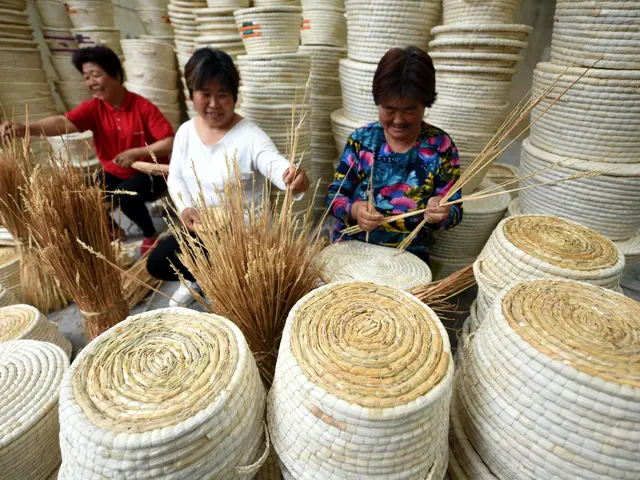Winter is a slack season for most Chinese farmers, but it is not the case for Jiang Suye and her pals.
While chatting in the living room, they plait straw into pads and strips by hand.
Jiang, 67, is from Xinhe Town in the city of Pingdu, east China's Shandong Province. She works eight hours a day to plait handbags out of wheat straw or corn husk, bringing home up to 2,000 yuan (290 U.S. dollars) every month.
Xinhe is known for its straw plaiting history of nearly 400 years, and the skill was listed as a provincial intangible cultural heritage in 2013.
Villagers never expected the traditional skills would be connected to fashion, drawing orders from international brands.
To meet the high standards of foreign companies, Jiang plants wheat and corn in her backyard, and she is very picky in selecting the materials.
"We have to choose the middle layer of the corn husk, which can't be too tender or overgrown. The wheat straws need to be shiny," she said.
In a workshop of Qingdao Yufengxiang Artware Co., Ltd., a straw handicraft company in Xinhe, workers are busy piecing the plaited straw together into handbags with sewing machines.
The workers are mainly local female farmers in their 50s or 60s who learned straw plaiting from older generations. The company's orders exceed 100,000 units a month on average.
Wang Jianming, general manager of the company, said apart from the 60-plus workers in the workshop, they outsourced the plaiting to villagers, the number of which sometimes exceeds 10,000.
"Up to 90 percent of the processing can be attributed to local farmers," he said, adding that the output of the company reached 25 million yuan last year.
The town now has over 90 straw handicraft enterprises. Among 103 villages in the town, more than 80 villages have set up straw plaiting outsourcing stations with over 20,000 part-time workers. The output of the straw plaiting industry reached 2.4 billion yuan in 2018.
The articles are exported to more than 50 countries and regions such as the United States, Britain, France and Japan. Favored by fashion brands, straw-plaited bags and hats even appear on the catwalks of international fashion weeks.
Zhao Jinli, 40, serves at the China branch of a British design company, which has long cooperated with British brands.
The company in Hangzhou, Zhejiang Province, has been doing business with straw handicraft enterprises in Xinhe for about five years, and annual orders total around 6 million yuan.
"Environmental friendliness and craftsmanship are our main considerations in choosing partners in China. Xinhe straw plaiting has a long history, mature skills and obvious industrial advantages," Zhao said.
To make the handicrafts more profitable, the local government registered its own brand in 2018.
"We expect to transform the traditional straw plaiting sector into a fashion industry," said Jiang Xun, director of the rural vitalization office of Xinhe's government.
(by Xinhua writers Wang Huan, Feng Yuanyuan and Lyu Qiuping)
 简体中文
简体中文

